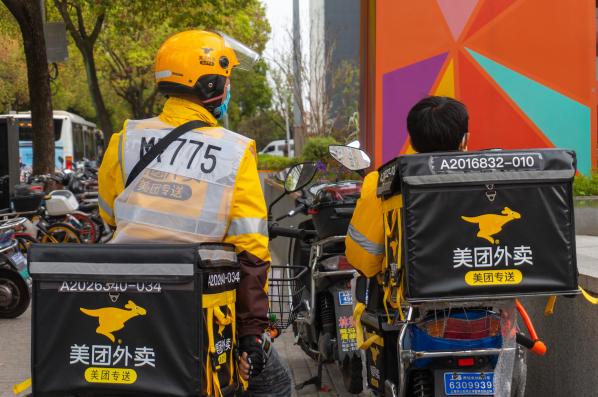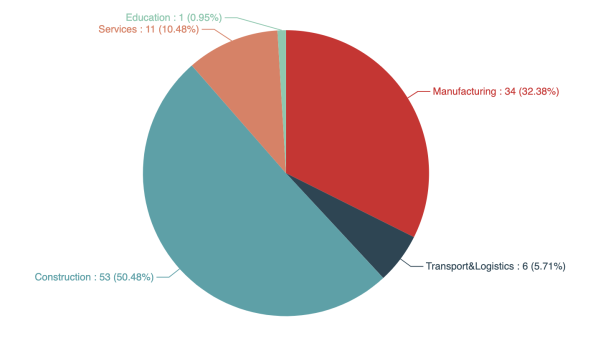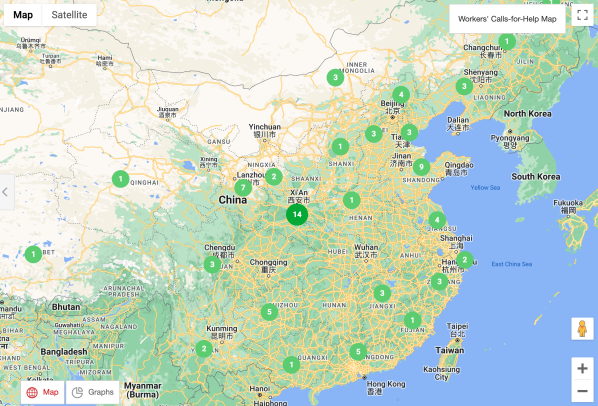
Photograph: Andy Feng / Shutterstock.com
CLB’s April 2023 mapping data again shows the rising trend of labour rights incidents in China’s manufacturing sector, and we also saw a pattern of food delivery rider strikes. For more on China’s gig economy, see our research explainer that we updated in April 2023.
But first, don’t miss the other content CLB has published recently:
- Surge of manufacturing protests in China deserves international attention. Since early January 2023, China Labour Bulletin has recorded 108 factory workers’ protests, over twice the amount logged in all of 2022. Reduced orders from international buyers and poor economic conditions have led factories to lay off workers, relocate to reduce costs, or shut down altogether. CLB’s study of these incidents reveals that the intent of China’s labour laws are not being followed, and international brands should take note of their responsibility to ensure suppliers comply with domestic laws.
- In an about-face, workers at a reputable Zhejiang garment factory strike over wage dispute. On 14 April, workers at the Jiaxing Quang Viet garment factory in Zhejiang province went on strike over decreased wages and unclear wage calculations. In our investigation, CLB found that the garment factory had a strong reputation for following China’s labour laws and even offered workers some additional benefits. This had engendered a sense of loyalty among workers, who were suddenly let down by pay cuts. The local union told CLB that it had tried to intervene in the workers’ “misunderstanding.” In response, CLB suggested that the union could have a role in acting as an intermediary among stakeholders, including international brands that the factory produces for, which include Adidas and New Balance.
- Global South workers have a new solution in light of brands’ unpaid Rana Plaza debt. Ten years on from the deadly Rana Plaza garment factory collapse in Dhaka, Bangladesh, that led to widespread calls for corporate accountability, CLB asks what - if anything - has changed for vulnerable workers in developing countries. CLB and our partners in Bangalore, India, seek a new solution of directly inviting brands to the bargaining table with workers and factory management to ensure that workers are not the ones continuously paying the price at the bottom of supply chains. New binding legislation on corporate due diligence may be useful at the workplace level to finally hold brands accountable, from the bottom up.
- May Day in Malaysia: Minimum guarantees for workers means a fairer society for all. For International Labour Day, CLB staff observed the annual May Day march and rally in Kuala Lumpur, Malaysia. This year’s theme was “dignified salary and food security,” and labour rights advocates voiced their demands for improving minimum guarantees for workers in Malaysia. CLB staff spoke to organizers and participants, and reflected on the value of worker organizing and global solidarity.
Meituan riders strike in Guangdong and Inner Mongolia
Since January this year, CLB’s Strike Map has recorded only five collective actions by food delivery riders, but this already exceeds the number we recorded for all of 2022. In April 2023, there were three separate incidents by Meituan workers. Two occurred in Guangdong province, in Shenzhen and Shanwei; and one in Hulunbuir, Inner Mongolia. In all three strikes, Meituan workers demanded an increase in delivery rate per order.
The protest by Meituan workers in Shanwei received widespread attention. On April 21, the continuous rain over Guangdong province made working conditions difficult. However, Meituan cancelled a number of rider subsidies, including for inclement weather. The company also kept lowering the rate per delivery. When workers went on strike, Meituan mobilised a large number of riders from all across China to deliver in Shanwei, rather than respond to the local riders' demands. After the situation in Shanwei stabilised, Meituan restored the unit price to its previous level and partially reintroduced the subsidy.
Factory worker strikes are sign that manufacturing sector is still struggling


